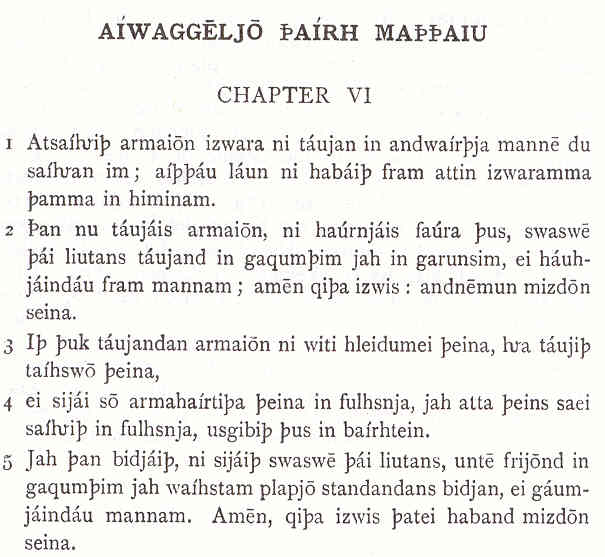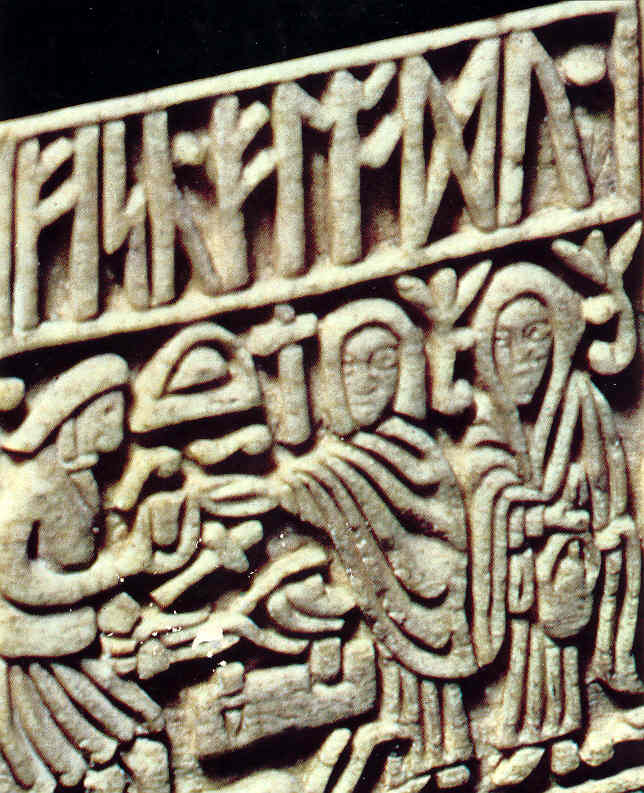Philology is a complex subject for which normally takes students
at least two semesters to acquire a basic familiarity. Here
it seems best to sum up the nature of its achievements. These
can be demonstrated in three ways.
Linguistic Reconstruction
In 1876 the Calcutta Justice Sir William Jones pointed out
similarities between the Sanskrit used in Classical Indian religious
texts and Latin and Greek.
 |
He suggested that all three languages may have evolved from
a common parent language. Over the next 150 years scholars began
to reconstruct this hypothetical parent language by comparing
languages for which we actually have written evidence and formulating
sound-change rules that explain their differences. For instance,
by comparing the word father in these languages (Sanskrit pitar,
Latin pater, Greek patér, English father,
Irish athair), it was suggested that the parent language
(called Indo-European) originally had a p as the first
sound. However, at some point this p became f
in one dialect of Indo-European, and that dialect eventually
evolved into English. In another dialect, the p disappeared
altogether, and this dialect eventually evolved into Irish.
Intermediary stages were postulated which helped to explain
other corresondances. For instance, the German word is Vater,
and it was suggested that the dialect of Indo-European in which
p became f (called Germanic) eventually underwent
another split, which then gave rise to separate German and English
forms. By the end of the nineteenth century the complete set
of rules explaining the sound changes between Indo-European
and Germanic had been formulated by the German scholar Jacob
Grimm (the formulation is thus known as 'Grimm's Law'). Many
of the rules which philologists devised to explain the relationships
between the languages of Indo-European origin were adopted by
Tolkien in inventing and relating his Elvish languages.
Cultural Exploration
The nineteenth century was an age of nationalism, and philology
was one way in which people pursued nationalistic interests.
Scholars like Grimm were actively trying to recover a lost Germanic
past by examining the linguistic correspondences they found.
By comparing references in the early literatures of Germany,
Scandinavia, and England, they reconstructed the pre-Christian
mythology of the Germanic world. Often the evidence could be
compared to distorted versions of old stories found in modern
fairy tales, and it is no accident that Jacob Grimm was also
responsible for the great compilation known as Grimm's Fairy
Tales. Germany was not the only country where nationalism
and philology went hand in hand. In England, there was great
interest in the Anglo-Saxon origins of the English nation and
its own participation in early Germanic culture. America shared
in this interest, and Thomas Jefferson made the study of Anglo-Saxon
compulsory at the University of Virginia because he believed
that Anglo-Saxon law contained the origins of English legal
traditions. He even wanted to make the Great Seal of the United
States portray the famous arrival of the Anglo-Saxon kings Hengest
and Horsa on English shores. An excellent example of Tolkien's
participation in this tradition of using philology to explore
the past is to be found in his treatment of the word Sigelware
in the Old English poem Exodus (discussed by Shippey
in The Road to Middle Earth, p. 39). The implications
of Tolkien's suggestion that Sigelware provided a glimpse
of a lost mythology are that philology allows us to say more
about the the conditions in which early authors wrote, and that
this knowledge should influence our interpretation of their
literature.
Textual Analysis
 |
In some cases the discoveries of philology are actually
the only way in which we can understand the text itself. As
a result of the ravages of time, much early literature has survived
only in incomplete or corrupt form. Philological knowledge often
allows us to supply readings that have been lost or restore
readings that have been changed because of the interference
or mistakes of copyists. More importantly, the principles used
to reconstruct Indo-European can be used to show the relations
between early English dialects at different times. As a result,
it is often possible -- on the basis of the language -- to determine
where and when individual texts were composed or written. This
is vital to our understanding of these texts. A good example
of this is Tolkien's own research on a group of texts which
were composed in the English West Midlands in the twelfth century.
All the texts had no explicit connexion other than a similarity
of dialect. The exciting thing about this dialect is the regularity
with which it was written, a regularity not found in text from
other regions, which could only be the product of a school.
But this was a period in which England was under Norman rule,
and French was imposed upon the literate classes. Clearly hear
was evidence that, in at least one part of England, the Anglo-Saxon
educational system had survived unbroken despite the Norman
Conquest.
This, of course, is only the tip of the iceberg. The relevance
of philology to The Lord of the Rings has been recognised
only slowly, perhaps because few of its fans and early critics
had much knowledge in the area. However, the importance of philology
has been discussed at length by T.A. Shippey in The Road
to Middle-Earth, especially in chapters 1-2, and we will
also be discussing it at length in class.
[Return to Top | Return
to Topics Page]

